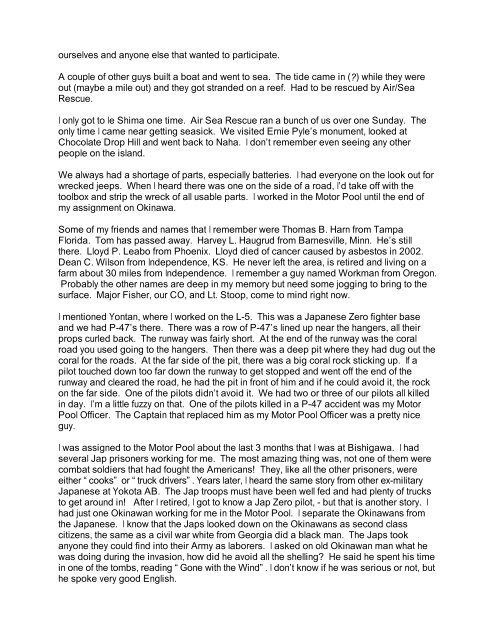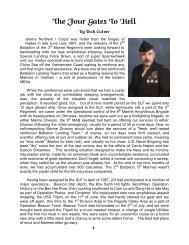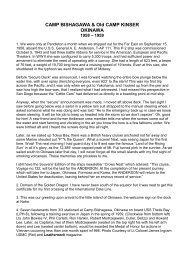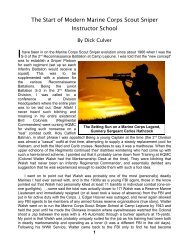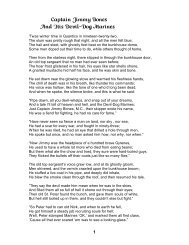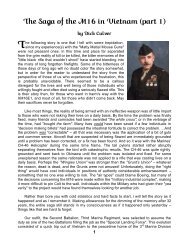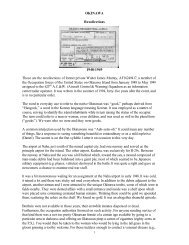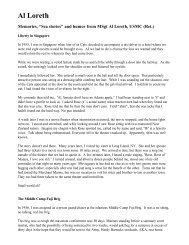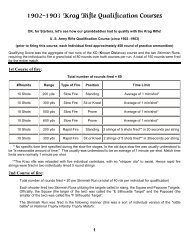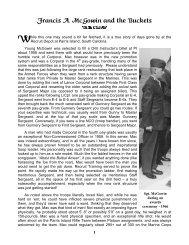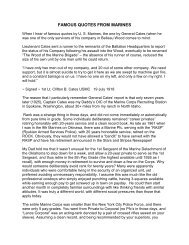Bill Choate at Bishagawa in 1946 - Rohrer, Bob Rohrer
Bill Choate at Bishagawa in 1946 - Rohrer, Bob Rohrer
Bill Choate at Bishagawa in 1946 - Rohrer, Bob Rohrer
Create successful ePaper yourself
Turn your PDF publications into a flip-book with our unique Google optimized e-Paper software.
ourselves and anyone else th<strong>at</strong> wanted to particip<strong>at</strong>e.<br />
A couple of other guys built a bo<strong>at</strong> and went to sea. The tide came <strong>in</strong> (?) while they were<br />
out (maybe a mile out) and they got stranded on a reef. Had to be rescued by Air/Sea<br />
Rescue.<br />
I only got to Ie Shima one time. Air Sea Rescue ran a bunch of us over one Sunday. The<br />
only time I came near gett<strong>in</strong>g seasick. We visited Ernie Pyle’s monument, looked <strong>at</strong><br />
Chocol<strong>at</strong>e Drop Hill and went back to Naha. I don’t remember even see<strong>in</strong>g any other<br />
people on the island.<br />
We always had a shortage of parts, especially b<strong>at</strong>teries. I had everyone on the look out for<br />
wrecked jeeps. When I heard there was one on the side of a road, I’d take off with the<br />
toolbox and strip the wreck of all usable parts. I worked <strong>in</strong> the Motor Pool until the end of<br />
my assignment on Ok<strong>in</strong>awa.<br />
Some of my friends and names th<strong>at</strong> I remember were Thomas B. Harn from Tampa<br />
Florida. Tom has passed away. Harvey L. Haugrud from Barnesville, M<strong>in</strong>n. He’s still<br />
there. Lloyd P. Leabo from Phoenix. Lloyd died of cancer caused by asbestos <strong>in</strong> 2002.<br />
Dean C. Wilson from Independence, KS. He never left the area, is retired and liv<strong>in</strong>g on a<br />
farm about 30 miles from Independence. I remember a guy named Workman from Oregon.<br />
Probably the other names are deep <strong>in</strong> my memory but need some jogg<strong>in</strong>g to br<strong>in</strong>g to the<br />
surface. Major Fisher, our CO, and Lt. Stoop, come to m<strong>in</strong>d right now.<br />
I mentioned Yontan, where I worked on the L-5. This was a Japanese Zero fighter base<br />
and we had P-47’s there. There was a row of P-47’s l<strong>in</strong>ed up near the hangers, all their<br />
props curled back. The runway was fairly short. At the end of the runway was the coral<br />
road you used go<strong>in</strong>g to the hangers. Then there was a deep pit where they had dug out the<br />
coral for the roads. At the far side of the pit, there was a big coral rock stick<strong>in</strong>g up. If a<br />
pilot touched down too far down the runway to get stopped and went off the end of the<br />
runway and cleared the road, he had the pit <strong>in</strong> front of him and if he could avoid it, the rock<br />
on the far side. One of the pilots didn’t avoid it. We had two or three of our pilots all killed<br />
<strong>in</strong> day. I’m a little fuzzy on th<strong>at</strong>. One of the pilots killed <strong>in</strong> a P-47 accident was my Motor<br />
Pool Officer. The Capta<strong>in</strong> th<strong>at</strong> replaced him as my Motor Pool Officer was a pretty nice<br />
guy.<br />
I was assigned to the Motor Pool about the last 3 months th<strong>at</strong> I was <strong>at</strong> Bishigawa. I had<br />
several Jap prisoners work<strong>in</strong>g for me. The most amaz<strong>in</strong>g th<strong>in</strong>g was, not one of them were<br />
comb<strong>at</strong> soldiers th<strong>at</strong> had fought the Americans! They, like all the other prisoners, were<br />
either “cooks” or “truck drivers”. Years l<strong>at</strong>er, I heard the same story from other ex-military<br />
Japanese <strong>at</strong> Yokota AB. The Jap troops must have been well fed and had plenty of trucks<br />
to get around <strong>in</strong>! After I retired, I got to know a Jap Zero pilot, - but th<strong>at</strong> is another story. I<br />
had just one Ok<strong>in</strong>awan work<strong>in</strong>g for me <strong>in</strong> the Motor Pool. I separ<strong>at</strong>e the Ok<strong>in</strong>awans from<br />
the Japanese. I know th<strong>at</strong> the Japs looked down on the Ok<strong>in</strong>awans as second class<br />
citizens, the same as a civil war white from Georgia did a black man. The Japs took<br />
anyone they could f<strong>in</strong>d <strong>in</strong>to their Army as laborers. I asked on old Ok<strong>in</strong>awan man wh<strong>at</strong> he<br />
was do<strong>in</strong>g dur<strong>in</strong>g the <strong>in</strong>vasion, how did he avoid all the shell<strong>in</strong>g? He said he spent his time<br />
<strong>in</strong> one of the tombs, read<strong>in</strong>g “Gone with the W<strong>in</strong>d”. I don’t know if he was serious or not, but<br />
he spoke very good English.


